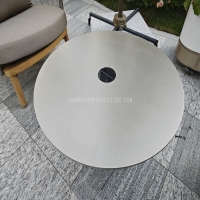Welcome to the website for landscape facilities products and knowledge.
What are the best materials for landscape tables to resist damage from acidic substances?
When selecting materials for landscape tables, resistance to acidic substances is crucial for longevity and aesthetics. Acidic spills, such as citrus juices or vinegar, can damage surfaces over time, so choosing the right material is essential.
1. Stainless Steel: Highly resistant to acids and corrosion, stainless steel is ideal for outdoor tables. Its sleek, modern look suits contemporary landscapes, and it requires minimal maintenance.
2. Polyethylene (HDPE): This synthetic material is non-porous and immune to acid damage. HDPE tables are lightweight, eco-friendly, and available in various colors.
3. Teak Wood: Naturally resistant to acids and moisture, teak is a premium choice. Its rich appearance ages beautifully, though periodic sealing enhances durability.
4. Powder-Coated Aluminum: Aluminum tables with a powder-coated finish resist acidic corrosion while offering lightweight portability. The coating adds extra protection against scratches.
5. Concrete with Sealant: Sealed concrete tables withstand acidic exposure and harsh weather. Their industrial-chic style fits modern outdoor spaces.
For optimal performance, pair these materials with proper maintenance, like regular cleaning and resealing (where applicable). Investing in acid-resistant landscape tables ensures they remain functional and attractive for years.
Related search:

Recommendation
Outdoor stainless steel table with solar-powered ambient lighting feature - excellent design.